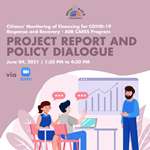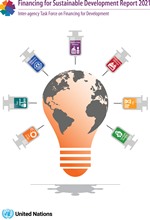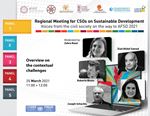Social Watch news
Published on Thu, 2021-06-03 13:18
Social Watch Philippines is organizing a Policy Dialogue on June 4, 2021 (Friday), from 1:30PM-4:30PM (Manila time) via Zoom in order to present the findings on the Citizens' Report of the AIIB Financing for COVID-19 Response and Recovery as well as key recommendations of the research to government leaders as well as representatives from civil society, people’s organizations, and other stakeholders. The objective of the Policy Dialogue is to present the Final Report to policymakers, to the CSO community, the media, and other stakeholders, in particular the key findings as well as recommendations, and to collectively generate learnings and insights on the importance of citizens’ engagement in the various aspects of public financing, including the accessing of loans, for government programs to combat the negative effects of the COVID-19 pandemic. |
Published on Tue, 2021-06-01 11:53
The Covid-19 pandemic is affecting the whole world, but in differentiated ways, highlighting structural inequalities within and between countries. The confluence of a health emergency and economic crisis has shown the disastrous consequences of undermining democratic governance and weakening public services. The crisis has elicited much talk of solidarity. But the brutal competition for vaccines shows that solidarity is used merely as a rhetorical phrase. The interests of a privileged elite continue to dominate. The prospects for recovery are diverging dangerously within and across countries and regions. The slogan “Leave no one behind” of the 2030 Agenda remains a mere mockery. |
Published on Tue, 2021-05-11 14:14
Arab NGO Network for Development (ANND) strongly condemns the attacks on defenseless Palestinians in Jerusalem and its neighborhoods, especially the attempt to uproot the residents of Sheikh Jarrah, calls on the international community to launch the broadest solidarity campaign with the Palestinian people and provide international protection for defenseless citizens in implementation of international laws, especially the Geneva Convention. |
Published on Thu, 2021-05-06 17:47
In 2007, the UN General Assembly (UNGA) established an Ad Hoc Working Group on the revitalization of the work of the General Assembly (AHWG) which in recent years has addressed the selection process of the UN Secretary-General (S-G). The current S-G Antonio Guterres’ five-year term is set to expire on 31 December 2021 and Member States have begun activities for the 2021 selection and appointment for the UN S-G position, including a thematic debate on the selection process on 23 April. |
Published on Tue, 2021-05-04 14:17
The International Finance Corporation, the branch of the World Bank that lends to the private sector, is closely associated with the biggest corruption cases in history, including the infamous Odebrecht scandal that resulted in the removal, imprisonment and even suicide of several Latin American presidents. Yet diplomatic immunity has kept the Bank and its Private–Public Partnerships model away from scrutiny. |
Published on Tue, 2021-04-06 14:14
In the lead-up to the UN’s Financing for Development Forum that takes place virtually from April 12-15, the 2021 edition of the Financing for Sustainable Development Report has been released. The report is published by the so-called Inter-Agency Task Force (IATF), which comprises numerous UN entities, but also the International Monetary Fund, the World Bank and the World Trade Organization. It is widely considered the most comprehensive source of data and analysis on development finance topics. |
Published on Thu, 2021-03-25 00:00
The video of the virtual Campaign Activation Workshop “Making the 2030 Agenda accountable: What is the role for civil society?” is now online. The virtual workshop was co-organized by Global Policy Forum, Global Policy Watch and Social Watch as part of the 2021 SDG Global Festival of Action and it was held on March 25, 2021. |
Published on Wed, 2021-03-24 12:03
Invitation to attend The Regional Meeting for CSOs on Sustainable Development in the Arab Region. Representatives of civil society and experts in Arab countries will discuss efforts to achieve sustainable development in the Arab region and the challenges it faces. The meeting will propose practical recommendations at the level of public policies to be submitted to the Arab Forum on Sustainable Development and through it to the High-level Political Forum to be held in July 2021 in New York. |
Published on Thu, 2021-03-18 11:02
The promise of the SDGs makes governments accountable but who is to be made responsible for global issues like the climate, the pandemic or finances? Join us to discuss this issue in a workshop hosted by Global Policy Forum, Global Policy Watch and Social Watch as part of the 2021 SDG Global Festival of Action. The workshop will be held on March 25, 2021 from 04:30 to 05:30 PM (CET). |
Published on Fri, 2021-02-19 14:13
The demands and urgency of addressing COVID-19 related issues have been added to the already crowded United Nations agenda, with consideration and intensity shifting up and down on the scale of priorities. |
SUSCRIBE TO OUR NEWSLETTER











